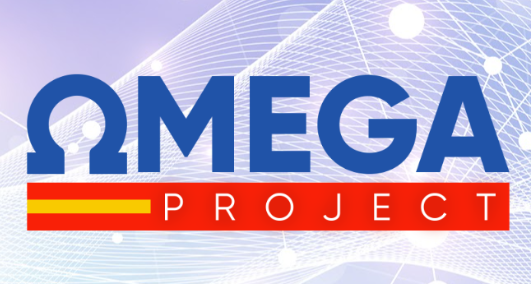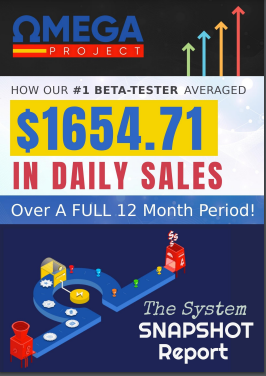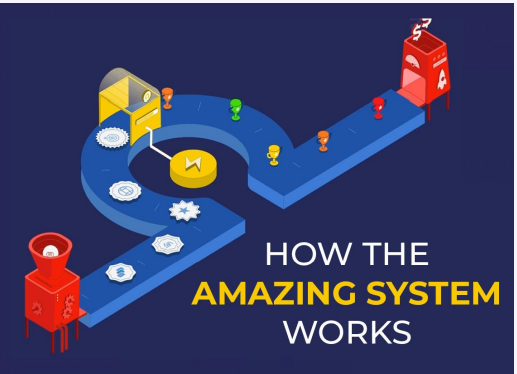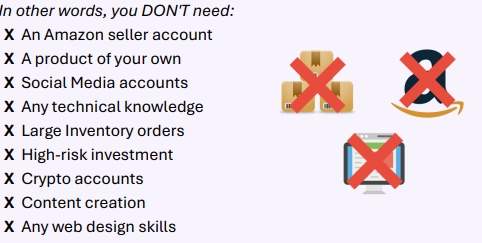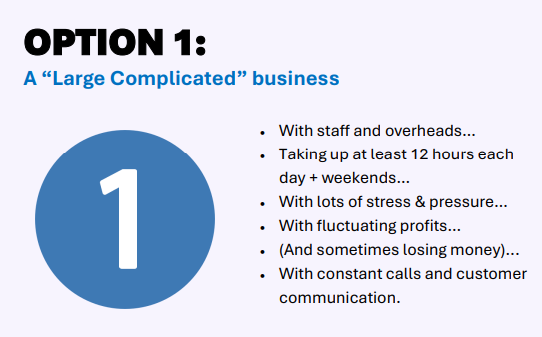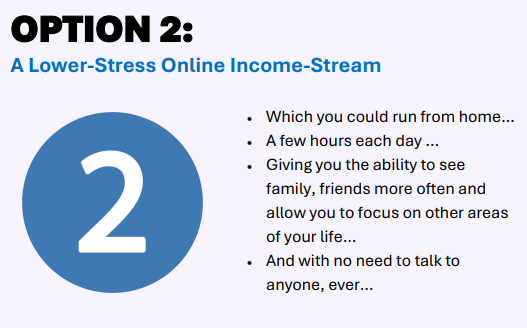As move into 2025, the digital learning landscape continues to evolve, offering exciting opportunities for those looking to boost their income through online education. This comprehensive guide explores Top 5 Money-Making Online Courses for January 2025 poised to make a significant impact on your earning potential in the coming year.
These courses equip you with valuable skills and provide practical strategies for turning those skills into substantial income streams.
1. The Omega Project by Aidan Booth and Steve Clayton
The Omega Project By Aidan Booth and Steve Clayton, spearheaded by digital marketing veterans Aidan Booth and Steve Clayton, takes the crown as our top pick for money-making online courses in 2025. This innovative program alters the way people approach online business and income generation.
The Omega Project harnesses the power of artificial intelligence and machine learning to create highly profitable online stores. Booth and Clayton have designed this course to be accessible to entrepreneurs at all levels, from beginners to seasoned professionals.
The course focuses on sustainable, long-term business growth. In a world of fleeting trends, this course teaches students how to build e-commerce businesses that can withstand the test of time and adapt to the ever-changing digital landscape.
Course Structure
The Omega Project is structured into several comprehensive modules, each building upon the last to create a holistic understanding of AI-driven e-commerce:
- Foundations of AI-Powered E-commerce: This module introduces the basics of artificial intelligence and it’s applications in online retail.
You’ll learn how AI can streamline operations, enhance customer experiences, and boost sales.
- Setting Up Your AI-Enhanced Online Store: Here, you’ll get hands-on experience in creating your e-commerce platform with integrated AI tools.
The course covers everything from choosing the right platform to implementing AI-powered product recommendations and chatbots.
- Advanced AI Marketing Strategies: This module dives deep into using AI for targeted marketing campaigns, personalized email marketing, and social media advertising.
You’ll learn how to leverage machine learning algorithms to optimize your marketing efforts and increase ROI.
- AI-Driven Inventory Management and Pricing: Discover how to use AI to predict inventory needs, optimize pricing strategies, and reduce overstock or stockouts.
This module also covers dynamic pricing models that can maximize your profits.
- Customer Service and Retention with AI: Learn how to apply AI-powered customer service solutions, including chatbots and predictive analytics, to improve customer satisfaction and increase retention rates.
- Scaling Your AI-Powered E-commerce Business: The final module focuses on strategies for growing your business, including expanding to new markets, diversifying product lines, and leveraging AI for business intelligence and decision-making.
Practical Learning Approach
The Omega Project emphasizes practical, hands-on learning. You won’t just watch videos and take notes – you’ll be guided through the process of building your own AI-powered online business from the ground up.
By the time you complete the course, you’ll have a fully functional, revenue-generating online store to show for your efforts.
Ongoing Support and Updates
The Omega Project offers continuous support and updates to confirm your knowledge stays current in the fast-paced world of e-commerce and AI. As new technologies emerge and market trends shift, you’ll have access to the latest strategies and tools to keep your business ahead of the curve.
*This post contains affiliate links, meaning I may earn a commission at no extra cost to you if you make a purchase through these links. Thank you for supporting my work.*
2. Online Success Coaching by John Thornhill
Taking the second spot on our list is Online Success Coaching by John Thornhill. This course stands out for it’s personalized approach to online business coaching and it’s focus on creating and selling digital products.
John Thornhill, a seasoned veteran in the digital marketing space, has designed this course to help people tap into their unique expertise and transform it into profitable online ventures. If you’ve got specialized knowledge or skills that you’ve been itching to monetize, this program could be your golden ticket.
Course Overview
Online Success Coaching covers a wide range of topics, from product creation and marketing strategies to building an engaged audience.
Step-by-Step Program Structure
The course is structured as a step-by-step program, guiding you from the initial stages of identifying your niche to launching and scaling your online business:
- Niche Selection and Validation: Learn how to identify profitable niches that align with your expertise and passion.
This module includes market research techniques and tools to confirm your niche selection.
- Digital Product Creation: Dive into the process of creating high-quality digital products, including ebooks, online courses, software, and membership sites.
You’ll learn how to package your knowledge effectively for different formats.
- Building Your Online Presence: This module covers website creation, content marketing, and social media strategies to establish your authority in your chosen niche.
- Traffic Generation: Discover various methods to drive targeted traffic to your offers, including SEO, paid advertising, and social media marketing.
- Sales Funnel Optimization: Learn how to create effective sales funnels that convert visitors into customers, including strategies for upselling and cross-selling.
- Email Marketing Mastery: Develop skills in building and nurturing an email list, creating engaging email sequences, and maximizing the lifetime value of your subscribers.
- Scaling Your Business: Explore strategies for growing your online business, including outsourcing, automation, and expanding into new markets or product lines.
Community and Mentorship
One of the most valuable aspects of Online Success Coaching is the community aspect. When you enroll, you gain access to a network of like-minded entrepreneurs, fostering collaboration and support.
This community can be invaluable for motivation, problem-solving, and even potential partnerships as you build your business.
Thornhill also provides ongoing mentorship, ensuring that you have support even after completing the main course content. This long-term approach to coaching sets Online Success Coaching apart from many other programs in the market and provides you with a safety net as you navigate the sometimes turbulent waters of online entrepreneurship.
3. AI-Powered Freelancing Mastery
As we move into 2025, the freelance market is undergoing significant transformation because of AI integration. The AI-Powered Freelancing Mastery course prepares freelancers for this new landscape and helps them thrive in an AI-enhanced work environment.
This cutting-edge course teaches freelancers how to leverage AI tools to enhance their services, increase productivity, and command higher rates. It covers a range of AI applications relevant to various freelancing fields, from content creation and graphic design to programming and data analysis.
Course Content
- Introduction to AI for Freelancers: This module provides an overview of AI technologies relevant to freelancing, including natural language processing, machine learning, and computer vision.
- AI Tools for Content Creation: Learn how to use AI-powered writing assistants, content generators, and editing tools to enhance your writing services.
- AI in Graphic Design and Visual Arts: Explore AI tools for image generation, style transfer, and automated design processes to boost your creative output.
- AI-Enhanced Programming and Web Development: Discover how AI can assist in code generation, debugging, and optimization, making you a more effective developer.
- Data Analysis and Visualization with AI: Learn to leverage AI for advanced data analysis, predictive modeling, and creating compelling data visualizations.
- AI-Powered Project Management: Master AI tools for task automation, time tracking, and project planning to streamline your freelance business operations.
- Client Communication and Collaboration with AI: Explore AI-powered tools for client relationship management, proposal writing, and virtual assistance.
- Ethical Considerations in AI-Enhanced Freelancing: Understand the ethical implications of using AI in your work and learn best practices for responsible AI use.
Future-Proofing Freelance Careers
The course focuses on future-proofing freelance careers by teaching freelancers how to work alongside AI rather than compete with it. This approach provides a valuable skill set that will stay relevant as technology continues to advance.
By the end of the AI-Powered Freelancing Mastery course, you’ll be equipped with the skills to offer AI-enhanced services that set you apart from the competition. Whether you’re a writer, designer, programmer, or any other type of freelancer, this course will help you leverage AI to boost your productivity, expand your service offerings, and ultimately increase your earning potential.
4. Blockchain and Cryptocurrency Entrepreneurship
With the continued growth and evolution of blockchain technology and cryptocurrencies, this course offers a timely and potentially lucrative opportunity for aspiring entrepreneurs. The Blockchain and Cryptocurrency Entrepreneurship course provides a comprehensive understanding of blockchain technology, cryptocurrency markets, and the business opportunities they present.
Course Curriculum
- Blockchain Fundamentals: This module covers the basics of blockchain technology, including it’s history, how it works, and it’s potential applications across various industries.
- Cryptocurrency Markets and Trading: Learn about different types of cryptocurrencies, market dynamics, and trading strategies.
- Decentralized Finance (DeFi): Dive into the rapidly growing field of DeFi, including decentralized exchanges, lending platforms, and yield farming.
- Non-Fungible Tokens (NFTs): Understand the NFT ecosystem and learn how to create, market, and sell NFTs.
- Blockchain Business Models: Explore various business models enabled by blockchain technology and learn how to identify promising opportunities.
- Launching a Blockchain Startup: This module covers the practical aspects of starting a blockchain-based business, including fundraising through Initial Coin Offerings (ICOs) or Security Token Offerings (STOs).
- Regulatory Compliance and Legal Considerations: Navigate the complex legal and regulatory landscape surrounding blockchain and cryptocurrency businesses.
Practical Approach
The course takes a hands-on approach, guiding you through the process of conceptualizing, developing, and launching your own blockchain-based business or cryptocurrency project. This practical experience is invaluable in a field where theoretical knowledge alone is often not enough to succeed.
By the end of the course, you’ll have the knowledge and skills to:
- Identify promising blockchain and cryptocurrency business opportunities
- Develop and launch your own blockchain-based projects
- Understand and navigate the regulatory environment
- Implement effective marketing strategies for blockchain and crypto businesses
- Stay ahead of trends and innovations in the rapidly evolving crypto space
Whether you’re looking to launch your own cryptocurrency, develop blockchain-based applications, or provide consulting services in this field, the Blockchain and Cryptocurrency Entrepreneurship course provides the foundation you need to succeed in this exciting and potentially lucrative industry.
5. Sustainable E-commerce and Ethical Marketing
Rounding out our top five is a course that capitalizes on the growing consumer demand for sustainable and ethical business practices. The Sustainable E-commerce and Ethical Marketing course teaches students how to build profitable online businesses while prioritizing environmental and social responsibility.
Course Overview
This course covers a range of topics, including sustainable product sourcing, eco-friendly packaging solutions, transparent supply chain management, and marketing strategies that resonate with socially conscious consumers. The course teaches you how to build truly sustainable business models that can thrive in an increasingly eco-conscious market.
Course Modules
- Foundations of Sustainable E-commerce: This module introduces the principles of sustainability in business and their application to e-commerce.
- Sustainable Product Sourcing: Learn how to identify and partner with ethical suppliers, understand certifications, and confirm product sustainability.
- Eco-Friendly Packaging and Shipping: Explore sustainable packaging options and optimize your shipping processes to minimize environmental impact.
- Transparent Supply Chain Management: Develop strategies for creating and maintaining a transparent, ethical supply chain.
- Green Marketing Strategies: Learn how to effectively talk your sustainability efforts to consumers without greenwashing.
- Building a Sustainable Brand: Understand how to create a brand identity that authentically reflects your commitment to sustainability.
- Measuring and Reporting Sustainability: Learn how to track and report on your sustainability efforts, including carbon footprint calculation and sustainability reporting.
- Financial Aspects of Sustainable E-commerce: Explore strategies for balancing profitability with ethical practices, including pricing sustainable products and managing costs associated with eco-friendly practices.
Holistic Approach to Sustainability
The course takes a holistic approach to sustainability in e-commerce. You’ll learn how to:
- Identify and source sustainable products that align with consumer values
- Implement eco-friendly packaging and shipping practices that reduce environmental impact
- Develop transparent and ethical supply chains that build trust with consumers
- Create marketing campaigns that authentically talk your sustainability efforts
- Build a brand that resonates with environmentally and socially conscious consumers
The course also looks at the financial aspects of sustainable e-commerce, teaching you how to balance profitability with ethical practices. You’ll learn strategies for pricing sustainable products, managing costs associated with ethical sourcing and eco-friendly practices, and measuring the ROI of your sustainability efforts.
By focusing on this growing niche, the Sustainable E-commerce and Ethical Marketing course offers you the opportunity to tap into a market that’s both profitable and aligned with growing global concerns about sustainability and ethical business practices. As consumers become increasingly conscious of the environmental and social impact of their purchases, businesses that prioritize sustainability are poised for significant growth.
Frequently Asked Questions
What are the best online courses for making money in 2025?
The top online courses for making money in 2025 include The Omega Project, Online Success Coaching, AI-Powered Freelancing Mastery, Blockchain and Cryptocurrency Entrepreneurship, and Sustainable E-commerce and Ethical Marketing.
How can AI help in e-commerce businesses?
AI can help e-commerce businesses by automating tasks, personalizing customer experiences, optimizing pricing and inventory management, improving marketing strategies, and enhancing customer service through chatbots and predictive analytics.
Is blockchain technology still relevant for business in 2025?
Yes, blockchain technology stays highly relevant for business in 2025, offering opportunities in areas such as decentralized finance, smart contracts, supply chain management, and digital identity verification.
What skills are needed for successful freelancing in 2025?
Successful freelancing in 2025 requires a combination of traditional skills in your chosen field, proficiency with AI tools, adaptability to new technologies, strong communication skills, and the ability to manage your business effectively.
How can I start an online business with no experience?
You can start an online business with no experience by taking comprehensive courses like Online Success Coaching, which guide you through the process step-by-step, from identifying your niche to launching and scaling your business.
What is sustainable e-commerce?
Sustainable e-commerce involves running an online business that prioritizes environmental and social responsibility, including sustainable product sourcing, eco-friendly packaging, ethical supply chain management, and transparent business practices.
How much can I earn from online courses in 2025?
Earnings from online courses can vary widely depending on factors such as your niche, marketing efforts, and course quality. Some successful course creators earn six or seven-figure incomes, while others may earn more modest amounts.
Are AI-powered freelancing tools replacing human freelancers?
AI-powered tools are not replacing human freelancers but rather augmenting their capabilities. Successful freelancers in 2025 will be those who learn to effectively leverage AI tools to enhance their services and productivity.
What is the future of cryptocurrency entrepreneurship?
The future of cryptocurrency entrepreneurship looks promising, with opportunities in areas such as decentralized finance (DeFi), non-fungible tokens (NFTs), blockchain-based applications, and cryptocurrency trading platforms.
How can I confirm my online business is ethical and sustainable?
To confirm your online business is ethical and sustainable, focus on sourcing eco-friendly products, implementing transparent supply chains, using sustainable packaging, minimizing your carbon footprint, and clearly communicating your sustainability efforts to customers.
Key Takeaways
- The digital learning landscape in 2025 offers diverse paths to online success, catering to various interests and skill sets.
- AI integration is becoming increasingly important across many fields, from e-commerce to freelancing.
- Blockchain and cryptocurrency continue to present lucrative opportunities for entrepreneurs willing to navigate this complex but promising space.
- Sustainability and ethical practices are no longer optional but essential components of successful online businesses.
- Continuous learning and adaptation to new technologies and market trends are crucial for long-term success in the digital economy.
